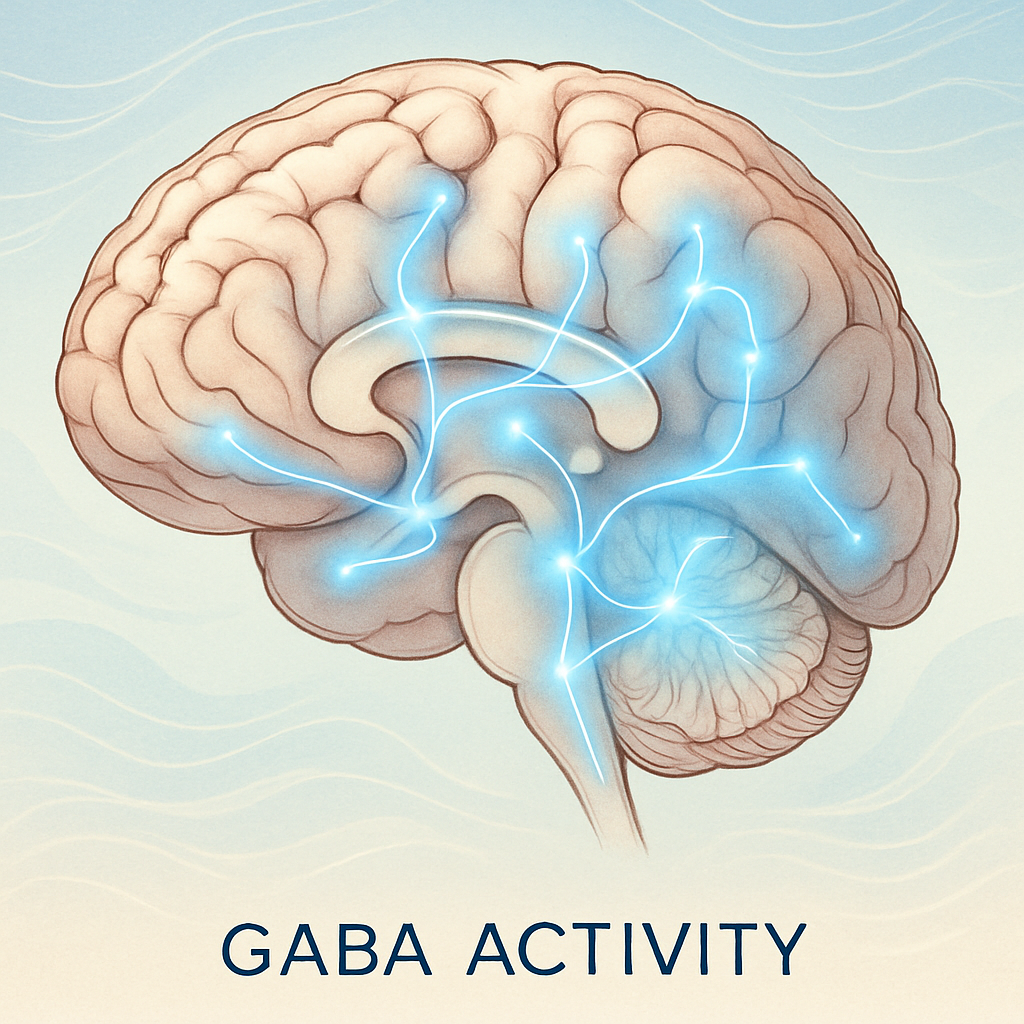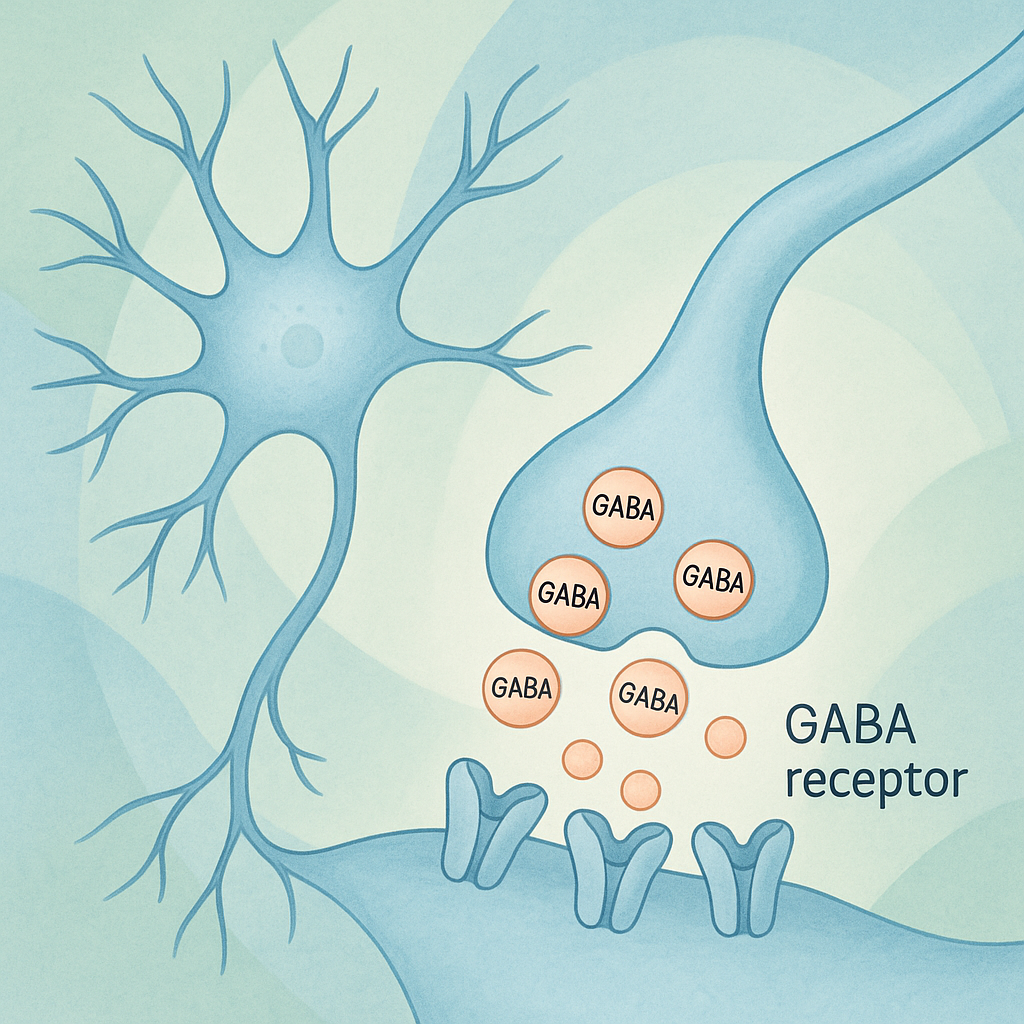GABA (gamma-aminobutyric acid) is a naturally occurring amino acid that plays a key role in our brain as the main inhibitory neurotransmitter. Due to its ability to reduce the activity of the nervous system, GABA is often called the “calm chemical”. This substance helps maintain emotional balance, reduce tension and promote deep relaxation.
Why is GABA important for our body?
Our central nervous system functions as a complex network of signals, where certain neurotransmitters excite and others inhibit the transmission of nerve impulses. GABA acts as a natural “brake”, helping the brain to take a breather from excessive activity and the body to regain internal balance.

GABA: Potential Health Benefits
1. Stress and Anxiety Management
GABA is one of the most studied substances in the context of stress and anxiety.
Scientific Research:
- A 2011 study* conducted in Japan showed that consuming GABA-enriched fermented dairy products reduced markers of stress levels in participants.
- Another clinical study** found that a single dose of 100 mg of GABA before a stressful task helped reduce feelings of tension, while maintaining psychological stability.
Mechanism of Action: GABA blocks some of the signals associated with overexcitation of the nervous system, thereby promoting relaxation. However, it is debated whether standard forms of GABA effectively reach the brain due to the blood-brain barrier – research in this area is still ongoing.
Practical Importance:
While scientific consensus on the effectiveness of oral GABA supplements is still emerging, some studies and user experiences suggest that GABA may be useful as an adjunct to stress reduction.
2. Sleep quality and relaxation
Studies show that GABA levels in the body are linked to sleep quality.
Research data:
- A 2016 study* showed that a combination of GABA and L-theanine helped participants fall asleep faster and improved their subjective sleep quality.
- Some neuroscience work suggests that GABA affects the sleep initiation phase and may affect the quality of REM sleep, which is important for emotional recovery.
Practical benefits:
GABA supplements may be helpful for people who have difficulty relaxing before bed. Unlike some medications, GABA does not cause daytime drowsiness – so it can be used during the day.
3. Blood pressure regulation
- Some studies suggest that GABA may have a vasodilating effect, which helps lower blood pressure.
Scientific evidence:
A clinical trial* conducted in Japan has shown that consuming fermented foods containing GABA for 8-12 weeks reduced systolic and diastolic blood pressure in people with mild hypertension.
Important: These studies were limited in size, and while the results are promising, GABA should not be used as a substitute for prescribed blood pressure medication. It can only be used as an adjunct to support cardiovascular health.
4. Cognitive function, attention, and concentration
- Early research suggests that GABA may help reduce the “noise” in the nervous system that makes it difficult to concentrate.
- Some studies have observed that GABA supplementation has improved brain wave activity related to attention.
- The possibility that GABA may indirectly help improve cognitive performance by reducing stress is also being explored.
Practical implications:
These findings are preliminary and require more evidence, but GABA’s effects on attention management remain an area of intense research.
5. Immune system and recovery after exercise
Some experimental studies have analyzed the influence of GABA on:
- regulation of inflammatory processes,
- immune system activity,
- growth hormone secretion after exercise.
What the studies show:
- Human studies show that a single intake of 3 g of GABA can increase blood growth hormone concentrations after exercise.
However, confirmation of long-term benefits or effectiveness is currently still being studied.
GABA Supplements – Do They Work?
One of the most debated questions about GABA concerns the effectiveness of oral supplements. It was long believed that GABA could not cross the blood-brain barrier (BBB), so oral supplements should not directly affect brain function.
However, recent research is challenging this belief. Some researchers have found that under certain conditions, GABA can reach the brain, or at least indirectly affect the central nervous system through the activity of peripheral nerves, especially the vagus nerve. In addition, GABA receptors are found not only in the brain, but also in other organs, including the digestive system and immune cells.
GABA supplements are available in various forms on the market: capsules, tablets, powders, and even GABA-enriched foods or drinks. The most common recommended dosages range from 100 mg to 750 mg per day, although some products offer higher doses.
Fermented GABA, often produced from probiotic bacteria, is claimed by some manufacturers to have better bioavailability and efficacy. Combinations of GABA with other substances, such as L-theanine, valerian root, or melatonin, are also popular, with the aim of enhancing the sedative effect.
It is important to note that the regulation of GABA supplements varies from country to country, and the quality and scope of clinical trials are still insufficient to draw definitive conclusions. Therefore, before starting to take these supplements, it is worth considering supplements for supporting cognitive function, which may have a wider impact on brain health.
GABA in foods – natural sources
While our bodies naturally produce GABA from glutamate, certain foods can also help increase the amount of this neurotransmitter in the body. It is worth noting that the amount of GABA found in food is usually lower than in supplements, but regular consumption of these products can help maintain overall GABA levels.
Fermented foods are one of the best natural sources of GABA.

Bacteria involved in the fermentation process can convert glutamate to GABA. These include kimchi, miso, tempeh, kefir, and some fermented cheeses. A specially fermented product called “GABA rice” is popular in Japan, which is made by allowing rice to germinate under controlled conditions, which significantly increases GABA levels.
Among vegetables, the highest levels of GABA are found in broccoli, spinach, celery, tomatoes, and potatoes. It is also worth paying attention to legumes, especially lentils and chickpeas, which not only contain GABA, but are also rich in glutamate, from which the body can produce this neurotransmitter.
Some types of tea, especially Japanese green tea “Gabaron” and “oolong” tea, are specially processed to increase GABA levels. These teas not only have sedative properties, but also have antioxidant properties.
Nuts and seeds, especially walnuts, almonds, and pumpkin seeds, are also good sources of GABA. They also contain many other beneficial nutrients, including healthy fats and antioxidants, which help support overall brain health.
Boosting GABA Naturally
In addition to a healthy diet, there are other ways to naturally increase GABA levels in your body. Regular physical activity, especially moderate-intensity aerobic exercise, can increase GABA levels in the brain. Studies show that even 30-60 minutes of exercise can have a positive effect on GABA levels.
Meditation and other stress management practices can also help optimize GABA levels. Studies have shown that people who meditate regularly have higher GABA levels in certain areas of the brain involved in mood regulation.
Adequate sleep is essential for maintaining a balance of GABA and other neurotransmitters. Chronic insomnia can reduce GABA activity, so it’s important to ensure regular, quality sleep.
Finally, some vitamins for brain and mood health can help maintain optimal GABA levels. B vitamins, especially B6, are important for GABA synthesis, and magnesium helps activate GABA receptors.
GABA Safety, Side Effects, and Interactions
While GABA supplements are considered safe for most people, it’s important to be aware of potential side effects and interactions with other medications. The most common side effects are relatively mild and include drowsiness, decreased alertness, and, in rare cases, digestive upset or headache.

Standard doses of GABA typically range from 100 to 750 mg per dose, with the maximum recommended daily dose for most users being around 3,000 mg. However, high doses can increase side effects, especially drowsiness, so it is not recommended to take GABA before driving or operating machinery.
Pregnant and breastfeeding women should pay special attention to the safety of GABA, as there is a lack of research on its safety in these groups. It is recommended to avoid GABA supplements during pregnancy and breastfeeding, or at least consult a doctor before taking them.
GABA can interact with various medications, especially those that affect the central nervous system. People taking antidepressants, anticonvulsants, sedatives, or hypnotics should be especially careful, as GABA can enhance the effects of these medications.
Interactions with high blood pressure medications have also been observed, as GABA can further lower blood pressure. People with hypotension (low blood pressure) should only take GABA supplements under the supervision of a healthcare professional.
Consuming alcohol with GABA supplements is also not recommended, as both have a depressant effect on the central nervous system, and the combination can cause excessive depression.
Individuals with certain neurological conditions, especially epilepsy or bipolar disorder, should be especially careful, as GABA may affect the course of these conditions. It is always advisable to consult a doctor before taking any supplements, including GABA.
If you are concerned about natural nervous system support, it is worth researching the best nervous system supplements that may be a safer alternative, especially if you are already taking other medications or have health conditions.
Conclusion
GABA is an extremely important neurotransmitter that plays a crucial role in maintaining nervous system balance and a sense of calm. While the importance of this substance is undeniable, scientific evidence on the effectiveness of oral GABA supplements remains mixed, particularly regarding their ability to cross the blood-brain barrier.
Nevertheless, many users report positive effects of GABA supplements in reducing anxiety, improving sleep quality, and helping with stress management. These subjective reports, along with new research suggesting possible mechanisms of action for GABA, support continued interest in these supplements.
The best strategy for most people would be to combine a variety of approaches—including including foods rich in or that stimulate GABA production in their diet, practicing stress-reducing activities, ensuring quality sleep, and, if necessary, considering supplement use under the supervision of a healthcare professional.
It is important to remember that GABA supplements are not a panacea and should not replace conventional treatment for serious medical conditions. It is always a good idea to consult a doctor before starting any supplement regimen, especially if you are already taking medications or have underlying health conditions.
Ultimately, natural ways to support the nervous system, including proper nutrition, regular physical activity, and stress management practices, remain key elements for overall brain health and optimal neurotransmitter balance.
Frequently Asked Questions
What is GABA, and what does it do?
GABA (gamma-aminobutyric acid) is a major inhibitory neurotransmitter that helps calm brain activity, reduce anxiety, and promote relaxation.
Do GABA supplements really work for anxiety or sleep disorders?
While some small studies suggest that GABA supplements may help reduce stress, anxiety, or improve sleep quality, more large-scale, high-quality research is needed. The effects may be related to other factors, and absorption into the brain is still a matter of debate.
What foods are naturally high in GABA?
Fermented foods like kimchi, miso, tempeh, as well as sprouted brown rice, broccoli, spinach, and certain teas are high in GABA or stimulate its production in the body.
Is it safe to take GABA supplements daily?
For most adults, short-term use of GABA supplements at standard doses (up to 750 mg per dose, 3,000 mg per day) is considered safe. However, long-term effects and safety of high doses are not well-studied; it is recommended that you consult your doctor.
Can GABA interact with medications I am taking?
Yes, especially with high blood pressure medications, anticonvulsants, and substances that affect the brain (such as alcohol or sedatives). Always consult a healthcare professional before taking GABA if you are taking prescription medications.

